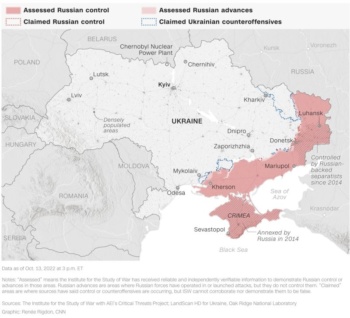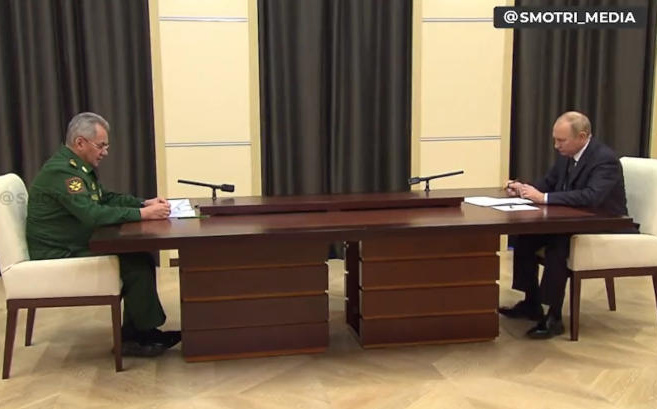Defense Minister Sergey Shoygu tells Vladimir Putin of the end of Russia’s mobilization for the Ukraine invasion, October 28, 2022
Friday’s Coverage: Putin — I Ordered “Dirty Bomb” Disinformation Campaign

Source: CNN
UPDATE 1509 GMT:
Russia has suspended the July deal to lift its blockade of Ukraine’s Black Sea ports.
The Defense Ministry renewed the threat to prevent Ukrainian exports of grains and other agricultural produce.
The deal, brokered by the UN and Turkey, comes up for renewal on November 19.
UN spokesman Stephane Dujarric reacted, “It is vital that all parties refrain from any action that would imperil the Black Sea Grain Initiative which is a critical humanitarian effort that is clearly having a positive impact on access to food for millions of people around the world.”
On Friday UN Secretary General António Guterres called on both Russia and Ukraine to extend the deal, under which more than 8 millions tons of grain have been exported from Ukraine.
Guterres called for other countries to speed up removal of any obstacles blocking Russian grain and fertilizer exports.
Ukraine Presidential Chief of Staff Andriy Yermak called out the Russian pretext for the renewed blockade, accusing it of “blackmail” and “invented terror attacks”.
The Russians claimed that they had foiled drone attacks on their Black Sea headquarters and shipping in Sevastopol in occupied Crimea.
“The primitiveness of Russian blackmail in everything. Nuclear blackmail, energy, food….Fictitious terrorist attacks on its own facilities,” Yermak wrote.
Foreign Minister Dmytro Kuleba added:
We have warned of Russia’s plans to ruin the Black Sea Grain Initiative. Now Moscow uses a false pretext to block the grain corridor which ensures food security for millions of people. I call on all states to demand Russia to stop its hunger games and recommit to its obligations.
— Dmytro Kuleba (@DmytroKuleba) October 29, 2022
UPDATE 1450 GMT:
Ukraine and Russia have exchanged a total of more than 100 prisoners of war.
Ukraine’s military said “52 Ukrainians returned home”. Russia and Denis Pushilin, the Russian proxy head of the “Donetsk People’s Republic”, said 50 people from each side were swapped.
UPDATE 1146 GMT:
The latest Russian attacks across the Donetsk region in eastern Ukraine have killed three civilians and injured eight.
Governor Pavlo Kyrylenko said two people were killed in Kurdiumivka and one in Pivnichne.
UPDATE 1059 GMT:
Russian proxy officials say they have completed the movement of Ukrainian residents out of occupied Kherson city in southern Ukraine.
Ukraine’s counter-offensive is closing on the city, which had a population of almost 300,000 people before the war and was occupied by Russian troops in the opening days of their February 24 invasion.
The head of the Russian proxy administration, Vladimir Saldo, said at least 70,000 people have been moved from their homes in the region.
Ukraine President Volodymyr Zelenskiy said in his nightly address to the nation:
The occupiers have decided to close down medical institutions in towns, take away medical equipment, ambulances, everything. They are putting pressure on doctors who still remain…to move to the territory of Russia.
Russia is trying to make the Kherson region a no man’s land.
In a symbolic marker of Russia’s retreat in the region, the remains of 18th century Russian statesman Prince Grigory Potemkin have been removed from his tomb in a cathedral east of Dnipro.
Potemkin is associated with the 18th-century conquest of Ukraine by Russia.
UPDATE 1036 GMT:
Canada has announced sanctions against another 35 Russian individuals and six companies.
The cited individuals include National Hockey League player Alexander Frolov and chess grandmaster Anton Demchenko. The companies are all involved in the energy sector.
Canada also announced the issuance of sovereign bonds for C$500 million to support Kyiv.
Ukraine President Volodymyr Zelenskiy said in his nightly address to the nation, “These bonds will be available for investment not only in Canada, but also around the world. This is an extremely powerful example for all our partners.”
UPDATE 1030 GMT:
Russian officials have designated three more journalists — Natalia Sindeeva, Vladimir Romensky and Ekaterina Kotrikadze — as “foreign agents”.
Sindeeva is the head of the independent channel TV Dozhd. The outlet was tagged as a “foreign agent” last year.
The main independent media outlets in Russia have been shut down or have suspended their operations. Dozhd’s last broadcast in the country was on March 3, a week after Vladimir Putin’s invasion of Ukraine.
The channel resumed broadcasting on July from studios in Latvia.
ORIGINAL ENTRY: Russia has announced the end of Vladimir Putin’s failed “partial mobilization” of men, which sought to check Ukrainian counter-offensives against the eight-month Russian invasion.
Defense Minister Sergey Shoygu said on Friday that 82,000 men have been sent to Ukraine and a further 218,000 are being trained in barracks to meet the target of 300,000 for Putin’s order of September 21.
State TV featured Shoygu’s declaration to Putin, “The task set by you of 300,000 people has been completed. No further measures are planned.”
The mobilization has had no effect in turning the tide of the war. Thousands of men have been sent to the frontline, notably in the Kherson region in the south, but have been poorly trained and equipped.
Meanwhile, the mobilization sparked widespread discontent within Russia, as security forces carried out a general, disorganized sweep. Those who were called up included the elderly, the seriously ill, and men who were supposed to be exempt from military service.
There was a mass departure from Russia as men tried to escape the call-up. Citing a Kremlin source, Novaya Gazeta Europe reported on September 26 that 261,000 men left in the five days since Putin’s order. By October 6, reports in Russia media put the figure of men and their families at 700,000.
The US-based Institute for the Study of War assesses that the Kremlin ended mobilization to free up administrative and training capacity for Russia’s autumn conscription, which begins on November 1.
The analysts summarize, “It is unclear how autumn 2022 conscripts will complete their training” since they are joining units “which are already fighting in Ukraine and badly damaged”. They continue:
Russia’s deployment of 41,000 poorly trained combat personnel to Ukraine may have temporarily stiffened Russian defensive lines, although these reservists have not yet faced the full weight of a major and prepared Ukrainian counteroffensive thrust.
The deployment has not significantly increased Russian combat power. The deployment of an additional 110,000 or so mobilized men to combat units therefore remains unlikely to change the trajectory of the war.
Russian mobilization, October 26-27: more regions wrap up mobilization while others hold last-minute draft raids, multiple mobilized POW videos appear, and state employees are forced to donate parts of their salaries "to support the troops" https://t.co/HybGoJztES pic.twitter.com/TsdwFmDPpN
— CIT (en) (@CITeam_en) October 28, 2022

